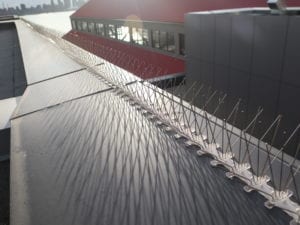
by Pigeon Patrol | Feb 16, 2020 | Animal Deterrent Products, Bird Deterrent Products, Bird Netting, Bird Spike, Pigeon Control, Pigeon Droppings, Pigeon Spikes, Pigeons in the News
Why are there so many of pigeons?
Feral pigeons are descended from wild rock doves and their populations have increased, especially in urban areas, in recent years.
Feral pigeons often form large flocks that roost on buildings, ledges and under bridges. They can often be found in loft spaces and empty buildings – anywhere that offers a small amount of shelter. Feral pigeons can breed all year round if food is in good supply and raise between three and six broods of two ‘squabs’ a year. Food is the most important factor determining the size of any pigeon population, and the best known, long term solutions to pigeon problems is to restrict its availability.
What do pigeons eat?
Their preferred diet is grain and seed, but they will scavenge food, take food from bird tables and eat household scraps and discarded takeaway foods.
Pigeons are wild birds capable of finding their own food. In a public area throwing food on to the ground can be considered as littering and will attract rats. Waste human food does not contain the essential vitamins the birds require and can lead to ill health and deformity.
Feeding pigeons in itself is not against the law but it is not necessary. It results in all year breeding that causes overcrowding. If feeding is reduced, their numbers will decline resulting in a smaller healthier flock with less need for drastic control measures.
Please do not feed the pigeons.
source
At Pigeon Patrol, we manufacture and offer a variety of bird deterrents, ranging from Ultra-flex Bird Spikes with UV protection, Bird Netting, 4-S Gel and the best Ultrasonic and audible sound

devices on the market today.
Contact us at 1- 877– 4– NO-BIRD, (604) 585-9279 or visit our website at www.pigeonpatrol.ca
Bird Gone, Pigeon Gone, Seagull Gone, Pigeon issue, pigeon spikes, 1-877-4NO-BIRD, 4-S Gel, Bird Control, Pigeon Control, bird repellent, Bird Spikes, sonic bird repellent, stainless steel bird spikes, bird spikes Vancouver, Ultra Sonic Bird Control, Bird Netting, Plastic Bird Spikes, Canada bird spike deterrents, Pigeon Pests, B Gone Pigeon, Pigeon Patrol, pest controller, pest control operator, pest control technician, Pigeon Control Products, humane pigeon spikes, pigeon deterrents, pigeon traps, Pigeon repellents, Sound & Laser Deterrents, wildlife control, raccoon, skunk, squirrel deterrent, De-Fence Spikes, Dragons Den, Canada bird spikes, Canada pigeon, pigeon control, pigeon patrol, pigeon. Kill pigeons, crow, starling
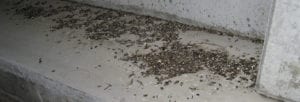
by Pigeon Patrol | Feb 16, 2020 | Animal Deterrent Products, Bird Deterrent Products, Bird Netting, Pigeon Droppings, Pigeon Patrol's Services, Pigeon Spikes, UltraSonic Bird Control
Pigeons problems have devastating effects on the heating and cooling components and indoor air quality of a commercial facility. Pigeon problems affect employees, maintenance personnel and potentially customers through the HVAC system.
HVAC Systems Make Perfect Pigeon Coups
Unfortunately, rooftop heating and cooling units are a perfect place for pigeons to nest. To seek shelter from the elements, pigeons typically enter air handler units through the fresh air intakes and build their nests within the HVAC unit. A single pair of pigeons can generate up to 18 new pigeons per year. Once a nest is established, pigeons are extremely territorial.
Indoor Air Quality
An HVAC system distributes the air throughout a facility. The bacteria, fungi and parasites that live and grow in pigeon droppings can carry and transmit any of 60 known diseases. Exposure to pigeon feces and other organic matter such as feathers carcasses and nesting material from the HVAC system may pose a considerable health threat to people who come in contact with them or inhale the airborne particles from them. Every precaution should be taken to ensure that building occupants and maintenance personnel are protected from pigeon feces.
Damage to HVAC Systems
As pigeons live in the air handler units they peck through filter material allowing unfiltered air and pigeon contaminants to freely enter the ventilation system. There are numerous damaging problems to an HVAC system from pigeon.
- Filter banks: Pigeons peck though filter banks allowing for unfiltered air and pigeon contaminants to be drawn into HVAC components and supply air ducts.
- Fan Blower: Pigeon debris builds within the fan blades decreasing airflow.
- Air conditioner coils: Pigeon debris compacts within air conditioner coils and clogs the drain pan.
- Insulation: Pigeons peck at insulation to create nesting material allowing for raw fiberglass fibers to enter the airstream.
How Do You Correct Pigeon Problems?
Hire a professional wildlife service or animal control contractor to relocate existing pigeons, and install devices to prevent future intrusions. Have the pigeon debris removed by a professional air duct cleaning contractor. Be sure to have the air duct cleaning contractor inspect the supply air ducts downstream of the HVAC unit.
Source
At Pigeon Patrol, we manufacture and offer a variety of bird deterrents, ranging from Ultra-flex Bird Spikes with UV protection, Bird Netting, 4-S Gel and the best Ultrasonic and audible sound devices on the market today.
Contact us at 1- 877– 4– NO-BIRD, (604) 585-9279 or visit our website at www.pigeonpatrol.ca
Bird Gone, Pigeon Gone, Seagull Gone, Pigeon issue, pigeon spikes, 1-877-4NO-BIRD, 4-S Gel, Bird Control, Pigeon Control, bird repellent, Bird Spikes, sonic bird repellent, stainless steel bird spikes, bird spikes Vancouver, Ultra Sonic Bird Control, Bird Netting, Plastic Bird Spikes, Canada bird spike deterrents, Pigeon Pests, B Gone Pigeon, Pigeon Patrol, pest controller, pest control operator, pest control technician, Pigeon Control Products, humane pigeon spikes, pigeon deterrents, pigeon traps, Pigeon repellents, Sound & Laser Deterrents, wildlife control, raccoon, skunk, squirrel deterrent, De-Fence Spikes, Dragons Den, Canada bird spikes, Canada pigeon, pigeon control, pigeon patrol, pigeon. Kill pigeons, crow, starling
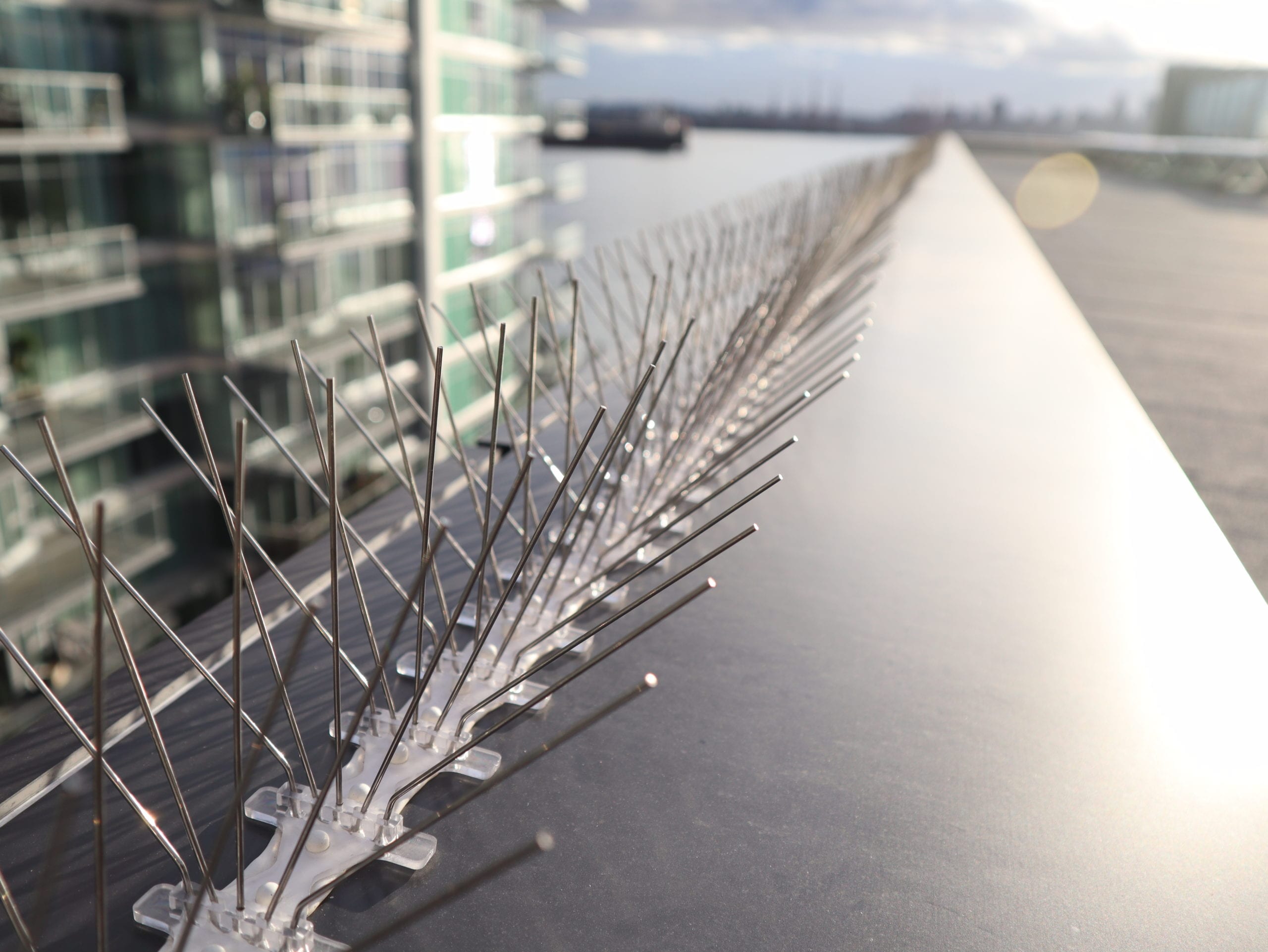
by Pigeon Patrol | Feb 16, 2020 | Animal Deterrent Products, Bird Deterrent Products, Bird Spike, Pigeon Control, Pigeon Droppings, Pigeon Patrol's Services, Pigeon Spikes, Pigeons in the News
Neighbors said they’ve done everything they can think of to get this pigeon problems to stop in their Rhawnhurst neighborhood.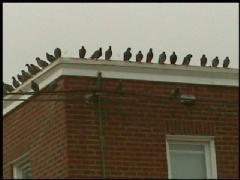
They’ve signed petitions. They’ve helped the City of Philadelphia take the case to court.
And still, every day, to put it bluntly, they’re pooped on by pigeons that flock there daily. That’s why they called the NBC 10 Investigators.
They wait on the wire.
“It’s disgusting,” said neighbor Eleanor Hennessy.
To neighbors, it feels like a nightmare scene right out of the old Alfred Hitchcock movie, “The Birds”,but Pigeon.
One look at the deposits left on an NBC 10 News car gives an idea what all of the screaming is about.
“It’s a crime against us,” said Hennessy’s husband, Francis.
And it has been going on for years.
“We’re out there every day washing our cars. Our dogs are getting pooped on, literally,” Cinque said.
“We couldn’t eat in our yard all summer. Kids next door couldn’t swim in their pool. You can’t hang laundry,” Francis Hennessy said.
“I’m working on a story about the pigeons,” said NBC 10’s Lu Ann Cahn as she approached.
“Oh, look, leave me alone. Go away,” said Karen Partain.
Partain owns the Rhawnhurst row home that has become the pigeon palace on Hartel Avenue.
Her husband, Joe Mutoli, wouldn’t answer the door. City health officials said despite six citations, Mutoli has continued to illegally put out a virtual bird buffet.
A seventh citation was delivered while NBC 10 was there.
Cahn said she was told there’s nothing wrong with a bird feeder. But the city said Mutoli has been told numerous times that he’s not allowed to throw feed on the ground and in a public school yard behind his home.
“His response has been that this is something he can do, and also there has been a lot of confrontation with our officers,” said Tara Derby, of the Philadelphia Animal Welfare Society.
“This is illegal, yes. There’s no way it’s legal. It’s in violation of the animal ordinance,” Derby said.
Experts said the food has caused the pigeon population to explode and the droppings are a health hazard.
“The droppings contain bacteria and viruses,” said William Ferraro, of the Philadelphia Health Department.
“I usually clean right after nap time,” said a local day care operator. “See, they’re circling now.”
The woman said she is constantly cleaning a small playground where the pigeon poop sometimes comes down like rain.
“If I would miss like one or two areas of droppings, of course the kids would find them, they would touch it and put it in their mouths,” said the daycare operator.
If it’s illegal, why can’t the city stop this?
“It’s the million dollar question,” said Eleanor Hennessy.
Neighbors said it’s hard to catch Mutoli throwing pigeon feed and show the city how serious this is.
So, the NBC 10 investigators sat in an undercover van and waited. It’s difficult to see because it was pitch-black outside, but sure enough at 11 p.m. one night, an NBC 10 crew caught Mutoli grab bird feed out of his garage and throw it through the fence of the neighboring schoolyard.
On video, he’s a shadowy figure. But Cahn said she and other crewmembers saw him clearly with their own eyes.
“You’ve continued to spread bird feed on the ground, and you know that’s illegal, right?” Cahn asked Mutoli over the phone.
Mutoli admitted on the phone that he shouldn’t be doing that and said he will stop. He claims he’s trying to move the birds away from his home and slowly wean them off food.
Neighbors said they’ve heard that before, but it never stops.
City officials told Cahn that you can’t throw a guy in prison for feeding pigeons. But as a result of this story and community pressure, NBC 10 has learned Mutoli is being ordered to appear in municipal court next month where he could be fined thousands of dollars.
Source
At Pigeon Patrol, we manufacture and offer a variety of bird deterrents, ranging from Ultra-flex Bird Spikes with UV protection, Bird Netting, 4-S Gel and the best Ultrasonic and audible sound devices on the market today.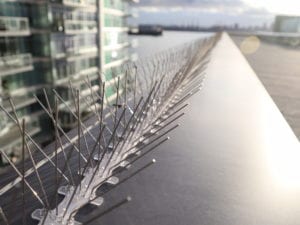
Contact us at 1- 877– 4– NO-BIRD, (604) 585-9279 or visit our website at www.pigeonpatrol.ca
Bird Gone, Pigeon Gone, Seagull Gone, Pigeon issue, pigeon spikes, 1-877-4NO-BIRD, 4-S Gel, Bird Control, Pigeon Control, bird repellent, Bird Spikes, sonic bird repellent, stainless steel bird spikes, bird spikes Vancouver, Ultra Sonic Bird Control, Bird Netting, Plastic Bird Spikes, Canada bird spike deterrents, Pigeon Pests, B Gone Pigeon, Pigeon Patrol, pest controller, pest control operator, pest control technician, Pigeon Control Products, humane pigeon spikes, pigeon deterrents, pigeon traps, Pigeon repellents, Sound & Laser Deterrents, wildlife control, raccoon, skunk, squirrel deterrent, De-Fence Spikes, Dragons Den, Canada bird spikes, Canada pigeon, pigeon control, pigeon patrol, pigeon. Kill pigeons, crow, starling
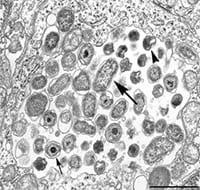
by Pigeon Patrol | Feb 16, 2020 | Bird Netting, Bird Spike, Pigeon Control, Pigeon Droppings, Pigeon Patrol's Services, Pigeon Spikes
Pigeons Carries harmful bacteria. Sampling of pigeons captured on the streets of Madrid has revealed the bacterial pathogens they carry. Researchers writing in BioMed Central’s open access journal Acta Veterinaria Scandinavica found two bugs that were highly prevalent in the bird population, Chlamydophila psittaci and Campylobacter jejuni, both of which cause illness in humans.
Fernando Esperón from the Animal Health Research Center, Madrid, Spain, worked with a team of researchers to analyse blood and enema samples taken from 118 pigeons caught using gun-propelled nets.
He said, “The present study demonstrates the extremely high prevalence of two zoonotic pathogens in feral pigeons in Madrid. At the same time, infection with these pathogens did not appear to be associated with any harmful clinical signs in the birds themselves. This leads to the hypothesis that pigeons act as asymptomatic reservoirs of  and Campylobacter jejuni which are harmful bacteria. These birds may therefore pose a public health risk to the human population.”
and Campylobacter jejuni which are harmful bacteria. These birds may therefore pose a public health risk to the human population.”
Chlamydophila psittaci was found in 52.6% of the pigeons captured, while Campylobacter jejuni was present in 69.1%. Although there have been few reports of disease transmission between pigeons and humans, it can occur by aerosols, direct contact or indirect contact through food and water contamination.
According to Esperón, “Thermophilic Campylobacter species are considered the primary pathogens responsible for acute diarrhea in the world. In fact, in many countries such as England and Wales, Canada, Australia and New Zealand Campylobacter jejuni infection causes more cases of acute diarrhea than infection by Salmonella species.”
Source
At Pigeon Patrol, we manufacture and offer a variety of bird deterrents, ranging from Ultra-flex Bird Spikes with UV protection, Bird Netting, 4-S Gel and the best Ultrasonic and audible sound devices on the market today.
Contact us at 1- 877– 4– NO-BIRD, (604) 585-9279 or visit our website at www.pigeonpatrol.ca
Bird Gone, Pigeon Gone, Seagull Gone, Pigeon issue, pigeon spikes, 1-877-4NO-BIRD, 4-S Gel, Bird Control, Pigeon Control, bird repellent, Bird Spikes, sonic bird repellent, stainless steel bird spikes, bird spikes Vancouver, Ultra Sonic Bird Control, Bird Netting, Plastic Bird Spikes, Canada bird spike deterrents, Pigeon Pests, B Gone Pigeon, Pigeon Patrol, pest controller, pest control operator, pest control technician, Pigeon Control Products, humane pigeon spikes, pigeon deterrents, pigeon traps, Pigeon repellents, Sound & Laser Deterrents, wildlife control, raccoon, skunk, squirrel deterrent, De-Fence Spikes, Dragons Den, Canada bird spikes, Canada pigeon, pigeon control, pigeon patrol, pigeon. Kill pigeons, crow, starling

by Pigeon Patrol | Feb 5, 2020 | 4-S Gel Bird repellent, Animal Deterrent Products, Bird Deterrent Products, Bird Netting, Bird Spikes, Pigeon Patrol's Services, Pigeon Spikes, Pigeons in the News, UltraSonic Bird Control
Newcastle Disease
What is Newcastle disease and what causes it? Newcastle disease is a contagious viral disease of birds and considered one of the most important poultry diseases worldwide. The disease can vary from mild to severe. A highly contagious and severe form of the disease, called exotic Newcastle disease (END), is so deadly that many birds die suddenly without showing any signs of disease. What animals get Newcastle disease? Both domestic and wild birds can be affected by Newcastle disease. Chickens are very susceptible to the disease. Turkeys, ducks, geese, as well as parrots, pigeons and wild cormorants can also get END. How can my animal get Newcastle disease? Newcastle disease is spread by direct contact with the droppings or respiratory discharges of infected birds. The virus can live for a long time in the environment and can be spread by objects (fomites), such as shoes, clothing, and equipment, that have become contaminated by infected birds. Outbreaks have occurred from the illegal imports of exotic birds. How does Newcastle disease affect my animal? Newcastle disease in birds can vary from no signs of illness to sudden death. Affected birds may have coughing, sneezing, nasal discharge, depression, and diarrhea. Chicken flocks may have a sudden decrease in egg production or produce thin shelled eggs. Signs of severe illness include swelling of the tissues of the head, muscle tremors, drooping wings, twisted head, circling, paralysis or sudden death. Can I get Newcastle disease? Yes. Infection is rare and usually very mild. People in direct contact with infected poultry or other birds can get conjunctivitis (swelling and reddening of the tissues around the eyes. Poultry crews and laboratory workers would be at the greatest risk for potential exposure to the virus during their work. No human cases of Newcastle disease have occurred from eating poultry products. Who should I contact, if I suspect Newcastle disease? In Animals – Contact your veterinarian immediately. Exotic Newcastle disease is not currently found in the U.S.; suspicion of the disease requires immediate attention. In Humans – Contact your physician. Tell him or her you have been in contact with birds with Newcastle disease. How can I protect my animals from Newcastle disease? Prevent your birds from becoming exposed to infected birds. Biosecurity measures, such as cleaning and disinfection of bird-housing facilities and equipment is very important. New introductions or birds returning to the farm should be isolated for several weeks before being placed into the flock. A vaccine is available for birds and is routinely used in poultry flocks. While this can reduce the severity of the disease, it does not completely prevent infection. How can I protect myself from Newcastle disease? When working with birds or poultry, especially when they are ill, wear protective clothing such as gloves, and safety glasses. Wash your hands after contact with birds or poultry. Avoid touching your eyes until your hands have been washed. People working with the virus in laboratories or on vaccination crews should take extra precautions. 
Source
At Pigeon Patrol, we manufacture and offer a variety of bird deterrents, ranging from Ultra-flex Bird Spikes with UV protection, Bird Netting, 4-S Gel and the best Ultrasonic and audible sound devices on the market today.
Contact us at 1- 877– 4– NO-BIRD, (604) 585-9279 or visit our website at www.pigeonpatrol.ca
Bird Gone, Pigeon Gone, Seagull Gone, Pigeon issue, pigeon spikes, 1-877-4NO-BIRD, 4-S Gel, Bird Control, Pigeon Control, bird repellent, Bird Spikes, sonic bird repellent, stainless steel bird spikes, bird spikes Vancouver, Ultra Sonic Bird Control, Bird Netting, Plastic Bird Spikes, Canada bird spike deterrents, Pigeon Pests, B Gone Pigeon, Pigeon Patrol, pest controller, pest control operator, pest control technician, Pigeon Control Products, humane pigeon spikes, pigeon deterrents, pigeon traps, Pigeon repellents, Sound & Laser Deterrents, wildlife control, raccoon, skunk, squirrel deterrent, De-Fence Spikes, Dragons Den, Canada bird spikes, Canada pigeon, pigeon control, pigeon patrol, pigeon. Kill pigeons, crow, starling
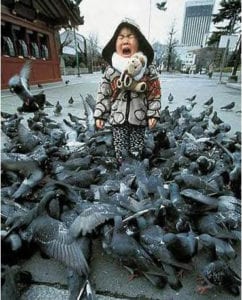
by Pigeon Patrol | Feb 5, 2020 | Animal Deterrent Products, Bird Deterrent Products, Bird Netting, Bird Spike, Bird Spikes, Pigeon Control, Pigeon Droppings, Pigeon Patrol's Services, Pigeon Spikes, UltraSonic Bird Control

Pigeons terrifying child
Bird that scares people, Ornithophobia is the medical term for bird phobias, but many people without a bona fide phobia still fear the creatures. Alfred Hitchcock’s horror film, “The Birds that scares people,” even played into people’s penchant to duck for cover when a bird is around. And of all the bird species, pigeons seem to get the worst rap of them all. Often called “rats of the sky,” pigeons used to be well respected for their homing abilities and were employed during wars to send messages back and forth between troops and base camp. According to HSUS, Hindu and Islamic nations still love these birds, but the tone is different in the United States, where many consider them flying rodents that spread disease and leave bird droppings everywhere they land.
An average pigeon is about 13 inches (32 centimeters) in length and weighs a little less than a pound. This bird is quite adept at living in heavily populated cities and makes its nests in support structures, on building ledges and under bridges. While pigeons and other birds have been known to dive bomb into a person’s head on occasion, you should really only be fearful of flying poop. Pigeon droppings do carry fungi that put humans at risk of contracting diseases, such as histoplasmosis. However, the odds of getting a disease from a pigeon are very low, and the few known cases in which that happened involved pigeon pet owners, not random city slickers.
Source
At Pigeon Patrol, we manufacture and offer a variety of bird deterrents, ranging from Ultra-flex Bird Spikes with UV protection, Bird Netting, 4-S Gel and the best Ultrasonic and audible sound devices on the market today.
Contact us at 1- 877– 4– NO-BIRD, (604) 585-9279 or visit our website at www.pigeonpatrol.ca
Bird Gone, Pigeon Gone, Seagull Gone, Pigeon issue, pigeon spikes, 1-877-4NO-BIRD, 4-S Gel, Bird Control, Pigeon Control, bird repellent, Bird Spikes, sonic bird repellent, stainless steel bird spikes, bird spikes Vancouver, Ultra Sonic Bird Control, Bird Netting, Plastic Bird Spikes, Canada bird spike deterrents, Pigeon Pests, B Gone Pigeon, Pigeon Patrol, pest controller, pest control operator, pest control technician, Pigeon Control Products, humane pigeon spikes, pigeon deterrents, pigeon traps, Pigeon repellents, Sound & Laser Deterrents, wildlife control, raccoon, skunk, squirrel deterrent, De-Fence Spikes, Dragons Den, Canada bird spikes, Canada pigeon, pigeon control, pigeon patrol, pigeon. Kill pigeons, crow, starling
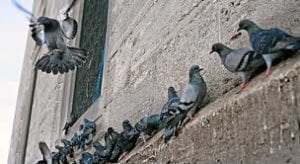
by Pigeon Patrol | Feb 5, 2020 | 4-S Gel Bird repellent, Animal Deterrent Products, Bird Deterrent Products, Bird Netting, Bird Spikes, Pigeon Droppings, Pigeon Patrol's Services, Pigeon Spikes, Pigeons in the News, UltraSonic Bird Control
With a warm spell of weather predicted, staff from Pigeon Patrol Pest Control are gearing up for more calls to deal with the bird they call the ‘flying rat’. 
Pigeons take advantage of the warmer weather to sit on outside ledges and pipework while their fouling fall to the floor below, creating a dangerously slippery surface.
Pigeon Patrol: “With pigeons now breeding four or five times a year, compared to two or three times 20 years ago, their numbers are increasing dramatically. The problem is exacerbated by people feeding them and attracting them into town squares where they are fouling on pavements and buildings.
“Pigeons are the most unhygienic and messy birds and actually carry more diseases than rats. They nest on their poo and attract mites. Nearly all pigeons carry the bird mite – a tiny insect that feeds off the bird, but will also makes humans itch and scratch. Pigeon fouling and nest materials also provide a home for many other insects such as clothes moths, carpet beetle and meal worm beetles.
Most of the pest controllers’ work against pigeons tends to be proofing of buildings and light wells, using a variety of techniques including installing nets, sprung wire systems and bird spike repellents.
Pigeon Patrol explained: “If a slipped tile goes unnoticed on a roof, or the louvers slip on a church bell tower, a pair of pigeons can get in and, in a matter of months, there can be hundreds of pigeons living in the loft space. The floor will soon be covered with fouling up to a foot deep.res further ‘natural-style’ habitats for these descendants of the Rock Dove – ll then have health and safety implications for engineers who come to service the equipment.
“Pigeon poo, when it is wet, is not too much of a danger apart from being slippery and the acidity will, of course, burn car paintwork. But when it is dry, as it often is in a loft space, or below sheltered machinery, then the airborne bacteria can become a real problem – affecting anybody that may be susceptible to asthma and other breathing difficulties.”
When pest controllers are called in, wearing special safety gear, they have to remove the birds, the nests and all loose fouling. The places they have to get to are often difficult to access, very restricted, very hot loft spaces that are about four-feet high – which is one of the reasons they dislike pigeons so much.
Pigeon Patrol Products and Services offers a specialist bird control service for facilities and property management companies in London, Sussex. Surrey and Kent, from the initial survey and specification through to the final proofing solution. As registered waste carriers, Pigeon Patrol can carry out full scale removal of bird fouling, as well as contaminated goods and furniture, from infested properties. As well as the feral pigeon, seagulls are becoming a greater problem for property owners and Pigeon Patrol can also offer advice and solutions for these pests as well.
Some facts about pigeons:
• A pigeon aged between 1 and 30 days is called a squab
• A pigeon’s white feathers have no color pigment
• Pigeons can see in color, but can also see ultra-violet light – a part of the light spectrum that humans cannot see
• Most birds take a sip of water and throw their heads back so it trickles down their throat – pigeons suck up water like straws
• In the 16th century, pigeon poo was a highly valued commodity as it was a source of salt petre or Potassium nitrate – a main ingredient of gunpowder! In France, it was also used to fertilise vineyards
• In India, the pigeon post mail service stopped in 2004
• Cher Ami and GI Joe were two famous war hero pigeons…both saved the lives of many soldiers by carrying important messages across enemy lines
• Young pigeons remain in their nests for up to two months…which is why it is only pest controllers who often get to see them!
• Peregrine Falcons are a natural predator of the pigeon…they can dive at up to 200 miles per hour. A pigeon can dive at about 70 miles an hour.
For more info
At Pigeon Patrol, we manufacture and offer a variety of bird deterrents, ranging from Ultra-flex Bird Spikes with UV protection, Bird Netting, 4-S Gel and the best Ultrasonic and audible sound devices on the market today.
Contact us at 1- 877– 4– NO-BIRD, (604) 585-9279 or visit our website at www.pigeonpatrol.ca
Bird Gone, Pigeon Gone, Seagull Gone, Pigeon issue, pigeon spikes, 1-877-4NO-BIRD, 4-S Gel, Bird Control, Pigeon Control, bird repellent, Bird Spikes, sonic bird repellent, stainless steel bird spikes, bird spikes Vancouver, Ultra Sonic Bird Control, Bird Netting, Plastic Bird Spikes, Canada bird spike deterrents, Pigeon Pests, B Gone Pigeon, Pigeon Patrol, pest controller, pest control operator, pest control technician, Pigeon Control Products, humane pigeon spikes, pigeon deterrents, pigeon traps, Pigeon repellents, Sound & Laser Deterrents, wildlife control, raccoon, skunk, squirrel deterrent, De-Fence Spikes, Dragons Den, Canada bird spikes, Canada pigeon, pigeon control, pigeon patrol, pigeon. Kill pigeons, crow, starling
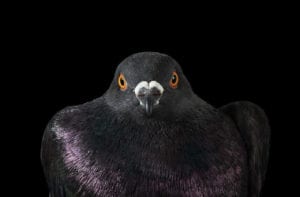
by Pigeon Patrol | Feb 5, 2020 | Animal Deterrent Products, Bird Deterrent Products, Bird Netting, Bird Spikes, Pigeon Control, Pigeon Droppings, Pigeon Patrol's Services, Pigeon Spikes, UltraSonic Bird Control
If you shoo a pigeon, that bird is likely to remember you and know to stay out of your way the next time you cross paths, according to a new study. Researchers found that wild, untrained pigeons can recognize individual people’s faces and are not fooled by a change of clothes.

Previous research in this arena had only focused on the perception abilities of pigeons that were trained in a lab environment, but the new study was conducted on untrained feral pigeons. At a park in Paris, two researchers of similar build and skin color, but wearing different-colored lab coats, fed a group of pigeons.
One researcher ignored the pigeons after feeding them, allowing them to eat the food, while the other was hostile and chased them away. This was followed by a second session when neither researcher chased away the pigeons. [Pretty Bird: Images of a Clever Parrot]
The experiment was repeated several times, with the pigeons continuously recognizing the individuals faces and avoiding the researcher who had first chased them away even when the participant no longer did so. Swapping lab coats during the experiments did not confuse the pigeons, and they continued to stay away from the researcher who had been initially hostile.
“It is very likely that the pigeons recognize the researchers by their faces, since the individuals were both female and of a similar age, build and skin color,” study researcher Dalila Bovet of the University of Paris Ouest Nanterre La Défense said in a statement.
“Interestingly, the pigeons, without training, spontaneously used the most relevant characteristics of the individuals (probably facial traits), instead of the lab coats that covered 90 percent of the body,” Bovet added.
The researchers noted that the birds appear to be able to differentiate between humans and are aware that clothing color is not a good way to tell humans apart. They theorize that this recognition ability may have come about over the long period of association with humans, from early domestication to many years of living in cities.
Previous research supports the findings, as the memory and recognition skills of certain bird species have been demonstrated by other studies. In May 2011, Seoul National University researcher Won Young Lee noticed that when he returned to an area where he had previously installed cameras into the nests of magpies, the birds recognized his face and began dive-bombing him.
A 2009 study showed that jackdaws, which are the smaller cousins of crows and ravens, can interpret human eye cues and even follow human gestures such as pointing. University of Oxford researchers noted that hand-raised jackdaws could find food when a familiar person’s eyes looked back and forth from the food to the bird. The birds also responded when the person pointed to the food’s location. However, the jackdaws took longer to approach food when an unfamiliar person was watching.
“I think they can generalize to human eyes somehow, and interpret human eyes as eyes,” said Auguste Bayern, a cognitive biologist at the University of Oxford and lead author of the 2009 study.
source
At Pigeon Patrol, we manufacture and offer a variety of bird deterrents, ranging from Ultra-flex Bird Spikes with UV protection, Bird Netting, 4-S Gel and the best Ultrasonic and audible sound devices on the market today.
Contact us at 1- 877– 4– NO-BIRD, (604) 585-9279 or visit our website at www.pigeonpatrol.ca
Bird Gone, Pigeon Gone, Seagull Gone, Pigeon issue, pigeon spikes, 1-877-4NO-BIRD, 4-S Gel, Bird Control, Pigeon Control, bird repellent, Bird Spikes, sonic bird repellent, stainless steel bird spikes, bird spikes Vancouver, Ultra Sonic Bird Control, Bird Netting, Plastic Bird Spikes, Canada bird spike deterrents, Pigeon Pests, B Gone Pigeon, Pigeon Patrol, pest controller, pest control operator, pest control technician, Pigeon Control Products, humane pigeon spikes, pigeon deterrents, pigeon traps, Pigeon repellents, Sound & Laser Deterrents, wildlife control, raccoon, skunk, squirrel deterrent, De-Fence Spikes, Dragons Den, Canada bird spikes, Canada pigeon, pigeon control, pigeon patrol, pigeon. Kill pigeons, crow, starling

by Pigeon Patrol | Feb 5, 2020 | 4-S Gel Bird repellent, Bird Deterrent Products, Bird Spike, Pigeon Patrol's Services, Pigeon Spikes, Pigeons in the News, UltraSonic Bird Control
LONDON (Reuters Life!) – Scientists studying pigeons have found that the often reviled urban bids that dominate city squares around the world carry two harmful disease-causing bugs that make them a public health hazard. 
The findings of the study by a team of researchers in Spain show that although these bacteria can be harmful to humans, they appear to cause no harm to the birds themselves.
As a result, pigeons — often dubbed “rats with wings” by those who suspect them of spreading disease — can act as living “reservoirs” for some harmful bugs, the scientists said.
“Animals that live in close contact with humans can be dangerous reservoirs of human pathogens,” wrote Fernando Esperon from the Animal Health Research Center in Madrid, who led the study. “These birds may therefore pose a public health risk to the human population.”
Inhabitants of cities from London to Venice to New York to San Francisco tend to have a love-hate relationship with the millions of urban pigeons that dominate city plazas, street-side cafes and monuments. Their droppings plaster Trafalgar square in London, St Mark’s square in Venice, and Times Square in New York, where they peck endlessly at crumbs or leftover food.
For this study, which was published in the BioMed Central journal Acta Veterinaria Scandinavica, Esperon and colleagues analyzed 118 pigeons captured using gun-propelled nets from urban areas of Madrid to find out the prevalence of certain bacteria known to cause disease in humans.
They found a bug called Chlamydophila psittaci in 52.6 percent of the pigeons captured, and another bug called Campylobacter jejuni in 69.1 percent.
Psittacosis infection in humans often starts with flu-like symptoms and can develop into life-threatening pneumonia. And according to Esperon, bugs from the campylobacter species are one of main causes of acute diarrhea across the world.
“In fact, in many countries such as England and Wales, Canada, Australia and New Zealand, Campylobacter jejuni infection causes more cases of acute diarrhea than infection by salmonella species,” he wrote.
Like other bugs, salmonella bacteria can cause fever, diarrhea, nausea and vomiting in those infected with it.
The scientists said that although the birds themselves did not seem to get sick from the bacteria, they could potentially pass them on the humans.
“These data should be taken into account for pigeon population management,” they wrote.
Source
At Pigeon Patrol, we manufacture and offer a variety of bird deterrents, ranging from Ultra-flex Bird Spikes with UV protection, Bird Netting, 4-S Gel and the best Ultrasonic and audible sound devices on the market today.
Contact us at 1- 877– 4– NO-BIRD, (604) 585-9279 or visit our website at www.pigeonpatrol.ca
Bird Gone, Pigeon Gone, Seagull Gone, Pigeon issue, pigeon spikes, 1-877-4NO-BIRD, 4-S Gel, Bird Control, Pigeon Control, bird repellent, Bird Spikes, sonic bird repellent, stainless steel bird spikes, bird spikes Vancouver, Ultra Sonic Bird Control, Bird Netting, Plastic Bird Spikes, Canada bird spike deterrents, Pigeon Pests, B Gone Pigeon, Pigeon Patrol, pest controller, pest control operator, pest control technician, Pigeon Control Products, humane pigeon spikes, pigeon deterrents, pigeon traps, Pigeon repellents, Sound & Laser Deterrents, wildlife control, raccoon, skunk, squirrel deterrent, De-Fence Spikes, Dragons Den, Canada bird spikes, Canada pigeon, pigeon control, pigeon patrol, pigeon. Kill pigeons, crow, starling

by Pigeon Patrol | Feb 5, 2020 | Animal Deterrent Products, Bird Deterrent Products, Bird Netting, Pigeon Control, Pigeon Droppings, Pigeon Patrol's Services, Pigeon Spikes, Pigeons in the News, UltraSonic Bird Control
Are Urban Vermin, the Most Disease-Ridden Animals?
Infections carried by animals are a rising threat—and those who work with livestock may have the most to fear
In many cities, pigeons—to take one urban animal—are reviled as flying vermin. They whitewash ledges and pick at filthy crumbs in the gutter. And, yes, these, dubbed by some as “rats with wings,” do carry diseases that humans can catch. But so do innumerable wild creatures outside city limits, the animals we eat—even our beloved pets.
Pigeons are guilty of transmitting fungal and bacterial diseases, primarily via their droppings, which pose the greatest risk to those with weakened immune systems. But cast against the recent spread of infectious zoonotic diseases—such as H5N1 bird flu, severe acute respiratory syndrome (SARS) and human immunodeficiency virus (HIV)—experts question the degree of concern over the disease-bearing potential of the birds that have colonized cities the world over.
In principle, any animal can carry a disease that humans could catch. But Marm Kilpatrick, an ecologist at the Consortium for Conservation Medicine in New York City, which studies human-induced environmental change, species health and biodiversity, wrote in an e-mail: “In reality, the vast majority [about 99.999 percent] of pathogens that are carried by animals won’t infect people.”
Even so, zoonotic diseases represent a growing proportion of emerging infectious diseases; two British studies calculated that about 75 percent of emerging infectious diseases are zoonotic. (By comparison, about 60 percent of all human pathogens can infect animals.)
Real rats (the ground-hugging kind) aren’t innocent by any means: Research links them with the reemergence of bubonic plague and typhus. But bats (of whom “winged rats” is more apropos) may be giving the unpopular rodents a run for their infamous reputation. Long associated with rabies, bats gained new notoriety in the 1990s after outbreaks of the Hendra and Nipah viruses killed both humans and livestock in Australia and Southeast Asia, respectively. A few years later SARS terrified the world by taking flight on commercial airlines. The virus left a trail leading back to the live animal markets in China, first to civet cats and subsequently to bats, the latter vector now believed to be the true starting point for the virus.
And, despite increasing urbanization throughout the world, people and wildlife are sharing more infections. In the Hendra and Nipah outbreaks, habitat fragmentation and increased contact between wild bats and domestic animals have been implicated. Bushmeat, particularly that of our close cousins the chimpanzee, has caused Ebola outbreaks in Africa.
In the U.S., prairie dog owners caught monkey pox from their pets. And the reforestation of Northeastern states over the past century has allowed deer populations to boom, spreading Lyme disease.
By comparison, pigeons’ potential for spreading bird flu seems rather minimal. So far most of nearly 220 human deaths caused by the pathogenic H5N1 strain of bird flu have been traced to contact with poultry. And the strain has yet to arrive in North America. If a similar one were to emerge here, the result could be disastrous for industrial farm workers before anyone else, according to Gregory Gray, director of the University of Iowa’s Center for Emerging Diseases.
“Exposure to domestic birds has changed markedly,” he says. In the nation’s confined animal feeding operations (CAFOs)—the industrial operations that have replaced family farms with at minimum 9,000-chicken or 750–large pig facilities—agricultural workers spend much more time in close contact with animals than a farmer would have 50 years ago.
These are potentially the mixing pots for the next flu pandemic, Gray argues. When an outbreak occurs undetected in a facility, viruses can mutate as they cycle through large flocks or herds. Gray and his colleagues have shown farmers, veterinarians and meat processors all had high swine influenza infection rates, and avian veterinarians carry more bird flu.
In 1983 a low-grade bird flu virus, perhaps left by ducks, spread into chicken warehouses in Pennsylvania. There, it mutated from a minor infection to become what Robert Webster, the virologist at the scene, called “Ebola for chickens.”
This outbreak took two years and the destruction of 17 million birds to control. Webster links some of its spread to New York City’s live bird markets, where chickens are packed into cages in close quarters with ducks and geese, natural carriers of bird flu.
Webster believes these markets pose a greater risk than CAFOs in the developed world where so-called “biosecurity” procedures to keep diseases out have been tightened since the emergence of H5N1. “Live bird markets are the breeding place for all pandemic strains in my opinion,” he says, and, despite attempts to purge it, avian influenza continues to show up in American live bird markets.
But for those whose daily animal interaction doesn’t extend beyond shooing squirrels or feeding the dog, the prospect of zoonotic disease shouldn’t keep them awake at night. “Most people should be more afraid to walk into a doctor’s office during flu season,” says Pennsylvania State University avian pathologist Patty Dunn.
As for pigeons: research has shown that even those infected with bird flu actually transmit very little. And they carry so little West Nile virus in their bloodstreams that they are unlikely to infect mosquitoes who could then infect humans, Kilpatrick says, making the birds more likely to slow an epidemic than spread one.
Source
At Pigeon Patrol, we manufacture and offer a variety of bird deterrents, ranging from Ultra-flex Bird Spikes with UV protection, Bird Netting, 4-S Gel and the best Ultrasonic and audible sound devices on the market today.
Contact us at 1- 877– 4– NO-BIRD, (604) 585-9279 or visit our website at www.pigeonpatrol.ca
Bird Gone, Pigeon Gone, Seagull Gone, Pigeon issue, pigeon spikes, 1-877-4NO-BIRD, 4-S Gel, Bird Control, Pigeon Control, bird repellent, Bird Spikes, sonic bird repellent, stainless steel bird spikes, bird spikes Vancouver, Ultra Sonic Bird Control, Bird Netting, Plastic Bird Spikes, Canada bird spike deterrents, Pigeon Pests, B Gone Pigeon, Pigeon Patrol, pest controller, pest control operator, pest control technician, Pigeon Control Products, humane pigeon spikes, pigeon deterrents, pigeon traps, Pigeon repellents, Sound & Laser Deterrents, wildlife control, raccoon, skunk, squirrel deterrent, De-Fence Spikes, Dragons Den, Canada bird spikes, Canada pigeon, pigeon control, pigeon patrol, pigeon. Kill pigeons, crow, starling

by Pigeon Patrol | Feb 5, 2020 | Animal Deterrent Products, Bird Spike, Pigeon Control, Pigeon Droppings, Pigeon Patrol's Services, Pigeon Spikes
A rare virus that can be contracted by humans has killed a large number of Victorian pigeons after being detected in Australia for the first time.

A type of avian paramyxovirus has resulted in the deaths of a number of hobby pigeon flocks.
Australian chief veterinary officer Dr Mark Schipp said the birds had died suddenly in large numbers.
The birds had sometimes appeared tired or shown neurological signs such as circling or head flicking before death.
He said human infection was extremely rare and usually occurred after contact with an infected bird.
“The rare virus causes only mild, short-term conjunctivitis or influenza-like symptoms [in humans],’’ Dr Schipp said.
“State veterinary authorities have been asked to review the health of their pigeon and poultry flocks.
“At this stage, there are no reports of this virus causing disease in wild birds, but we have asked the Australian Wildlife Health Network to be alert to this possibility.’’
Dr Schipp said the national Consultative Committee on Emergency Animal Disease had met twice to discuss the outbreak, which is being managed by Victorian chief veterinary officer Dr Hugh Millar and industry and veterinary authorities.
Dr Schipp said the consultative committee has agreed to investigating pigeon and other bird holdings where disease is suspected and to quarantine affected properties.
Anyone concerned about their pigeons or birds should contact an experienced poultry veterinarian, their local department of agriculture, or the Emergency Animal Disease Watch hotline on 1800 675 888.
Source
At Pigeon Patrol, we manufacture and offer a variety of bird deterrents, ranging from Ultra-flex Bird Spikes with UV protection, Bird Netting, 4-S Gel and the best Ultrasonic and audible sound devices on the market today.
Contact us at 1- 877– 4– NO-BIRD, (604) 585-9279 or visit our website at www.pigeonpatrol.ca
Bird Gone, Pigeon Gone, Seagull Gone, Pigeon issue, pigeon spikes, 1-877-4NO-BIRD, 4-S Gel, Bird Control, Pigeon Control, bird repellent, Bird Spikes, sonic bird repellent, stainless steel bird spikes, bird spikes Vancouver, Ultra Sonic Bird Control, Bird Netting, Plastic Bird Spikes, Canada bird spike deterrents, Pigeon Pests, B Gone Pigeon, Pigeon Patrol, pest controller, pest control operator, pest control technician, Pigeon Control Products, humane pigeon spikes, pigeon deterrents, pigeon traps, Pigeon repellents, Sound & Laser Deterrents, wildlife control, raccoon, skunk, squirrel deterrent, De-Fence Spikes, Dragons Den, Canada bird spikes, Canada pigeon, pigeon control, pigeon patrol, pigeon. Kill pigeons, crow, starling
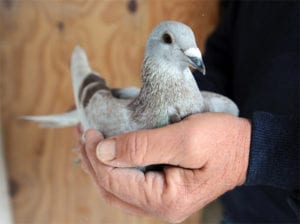
by Pigeon Patrol | Feb 5, 2020 | Bird Netting, Bird Spikes, Pigeon Control, Pigeon Patrol's Services, Pigeons in the News, UltraSonic Bird Control
Pet Bird Transmitted Diseases. It may be hard to believe, but your pet bird can make you sick. There are several diseases that birds can transmit to people (these are called zoonotic diseases). For your own health, it is important to understand how to prevent transmission of these diseases.
Simple hygiene can prevent most of the diseases that birds and humans share. If you are conscientious about cleaning up after your bird and always wash your hands after handling your bird or his bowl and toys, it’s very unlikely that you will become ill. Of course, not every bird harbors such infections, but it’s always best to be safe.
Who’s at Risk

Pigeon in New York City (file / credit: STAN HONDA/AFP/Getty Images)
The risk of getting a disease from your bird is typically highest in people who already have chronic diseases, such as the very young, the elderly, HIV-infected individuals, organ-transplant recipients, and people receiving chemotherapy. People at risk should speak with both their physician and their veterinarian about the relative risks of disease transmitted from pet birds.
The following conditions are some of the more common infections carried by birds:
- Chlamydiosis – Also known as Psittacosis, can be transmitted to humans. In people, the disease causes flu-like symptoms of fever, chills and headache. If left untreated, Psittacosis can cause liver and kidney damage or even meningitis. Note: This Chlamydia is not the same infectious agent that spreads among humans as a sexually transmitted disease.
- Chlamydia infection transmits through feces and infectious particles in the air. Treatment for the infection includes an antibiotic, doxycycline, which doctors and veterinarians use in humans and birds. If you find yourself or other family members coming down with “the flu” and your bird isn’t feeling well, it could be Chlamydia; contact your family doctor and your veterinarian.
In your bird: Psittacosis causes varying severity of illness in birds. Some birds are simply carriers; this is typical in the cockatiel. Other birds may lose their appetite and become emaciated, depressed and may develop difficulty in breathing or diarrhea. Without treatment, most birds die from this disease. Diagnosis requires a panel of tests because no single test can accurately determine whether your bird is infected. You should obtain these tests as part of a pre-purchase examination, especially if there are clinical signs of Psittacosis.
- Avian Tuberculosis – Not often seen in birds, but transmission to people can lead to respiratory infections, swelling of lymph nodes below the jaw and even widespread disease in people with weakened immune systems. The disease can spread through the air or through the feces from infected birds.
In your bird:
Affected birds usually have vague symptoms, such as loss of weight despite a good appetite, dull feather coloring, increase in urine output, diarrhea and anemia. Diagnostic tests aren’t too reliable, but a veterinarian experienced with avian diseases will usually examine the feces for bacteria. Euthanasia of a bird infected with Mycobacteria is necessary due to the potential danger to humans.
- Histoplasmosis – A respiratory infection in people who inhale fungal spores from contaminated soil or dust. The Histoplasma fungus grows on bird feces, so it’s a concern in buildings where large amounts of pigeon droppings collect in roosting sites. While this isn’t a big issue in pet birds, it is prudent not to allow fecal matter to accumulate to the point that mold can grow on it.
- Cryptococcus – Another fungal infection. Though uncommon in pet birds, infection can cause diarrhea, paralysis, nervous-system signs and masses with a gelatinous consistency. Humans can contract this disease when they inhale the dust from dried droppings (most commonly from pigeons). Infection in people can be quite serious leading to meningitis, encephalitis (brain inflammation) or respiratory symptoms.
- Allergic Alveolitus – While not truly a zoonotic disease in the sense that it does not affect birds, bird owners can contract Allergic Alveolitus by inhaling particles of bird dander in the air. Allergic Alveolitus also goes by the names of Pigeon Lung Disease and Parakeet Dander Pneumoconiosis.
- Campylobacteriosis – A bacterial infection that causes gastrointestinal problems. It usually transmits through fecal contamination of food and water. While diarrhea, weight loss, and lethargy are common, Campylobacteriosis can also be present in birds that show no symptoms of illness.
Although this list is not inclusive, it does list the more common diseases that can pass to humans keeping pet birds. Good hygiene practices are the best method of prevention!
Source
At Pigeon Patrol, we manufacture and offer a variety of bird deterrents, ranging from Ultra-flex Bird Spikes with UV protection, Bird Netting, 4-S Gel and the best Ultrasonic and audible sound devices on the market today.
Contact us at 1- 877– 4– NO-BIRD, (604) 585-9279 or visit our website at www.pigeonpatrol.ca
Bird Gone, Pigeon Gone, Seagull Gone, Pigeon issue, pigeon spikes, 1-877-4NO-BIRD, 4-S Gel, Bird Control, Pigeon Control, bird repellent, Bird Spikes, sonic bird repellent, stainless steel bird spikes, bird spikes Vancouver, Ultra Sonic Bird Control, Bird Netting, Plastic Bird Spikes, Canada bird spike deterrents, Pigeon Pests, B Gone Pigeon, Pigeon Patrol, pest controller, pest control operator, pest control technician, Pigeon Control Products, humane pigeon spikes, pigeon deterrents, pigeon traps, Pigeon repellents, Sound & Laser Deterrents, wildlife control, raccoon, skunk, squirrel deterrent, De-Fence Spikes, Dragons Den, Canada bird spikes, Canada pigeon, pigeon control, pigeon patrol, pigeon. Kill pigeons, crow, starling
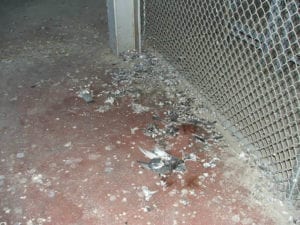
by Pigeon Patrol | Feb 5, 2020 | Bird Deterrent Products, Bird Netting, Bird Spikes, Pigeon Control, Pigeon Droppings, Pigeon Patrol's Services, Pigeon Spikes, Pigeons in the News, UltraSonic Bird Control
Woman battling crippling disease caused by pigeon feces
In the span of a few weeks, Erica Richards has been transformed from a vibrant 23-year-old woman who loved nature to a person battling for her life.
In early January, the Fredericton woman contracted a potentially fatal condition called cryptococcal meningitis, a fungal disease carried in pigeon feces.
The debilitating illness attacks the spine and brain, causing severe swelling. It left her confined to a hospital bed in a state of delirium for weeks.
But the most devastating side effect is that Ms. Richards is now blind.
“Be aware of this disease. It could kill a child in a heartbeat,” Ms. Richards said in an interview from her hospital bed.
“It could kill a senior in a heartbeat without you even having to worry about the symptoms. It comes on that fast. If you don’t realize the symptoms, it could kill you, too.”
Her emotional warning comes on the heels of city council’s approval earlier this month of a recommendation that it toughen its animal control bylaw to allow for fines for feeding pigeons. Once the amendment is drafted and declared law, it will give the city’s bylaw enforcement officers the power to ticket and fine offenders.
Ms. Richards said she decided to go public about her illness after learning about a recent newspaper story about a problem with pigeon poop in the city.
“Please don’t feed the pigeons,” she said. “Try to shoo them away if you see them. … It (the disease) is horrible. The pain that you get from this disease is crippling.
“The after-effects are with you for life and you just can’t stop thinking about it. I just want other people to know and try to stay away from pigeons and pigeon feces.”
Oddly enough, Ms. Richards said she has no recollection of ever being anywhere near pigeons.
“I am still wondering to this day where I got it,” she said. “I could have stepped in it and brought it into the home. I just don’t know.”
Ms. Richards said the symptoms started with a migraine headache that wouldn’t go away. She was admitted to hospital on Feb. 10 after many days of intense head pain. Shortly after, she went into a coma-like state.
“When I woke up I thought I had a mask over my eyes, but I was wrong. I was blind. I was recently told that I will be blind for the rest of my life. This is a tough thing for a 23-year-old to go through. … My world crumbled around me.”
Ms. Richards said the odds of surviving the disease are 50-50.
“However, I managed to make it through,” she said, battling tears. “I don’t know how but I am still here, and I am glad because I get to warn everyone else of this.”
Cristin Muecke, the Health Department’s regional medical officer, confirmed the disease is often associated with pigeon droppings. She said the illness can’t be spread person to person and is more common with someone who has immune problems.
Ms. Richards, however, said she has never had a problem with her immune system and that’s what’s so puzzling about contracting the affliction.
“I do not want anyone else to suffer this agonizing disease and I ask anyone who is feeding pigeons to stop,” she said. “It’s not just a matter of keeping your neighbourhood clean … it’s a matter of keeping people healthy.”
Source
At Pigeon Patrol, we manufacture and offer a variety of bird deterrents, ranging from Ultra-flex Bird Spikes with UV protection, Bird Netting, 4-S Gel and the best Ultrasonic and audible sound devices on the market today.
Contact us at 1- 877– 4– NO-BIRD, (604) 585-9279 or visit our website at www.pigeonpatrol.ca
Bird Gone, Pigeon Gone, Seagull Gone, Pigeon issue, pigeon spikes, 1-877-4NO-BIRD, 4-S Gel, Bird Control, Pigeon Control, bird repellent, Bird Spikes, sonic bird repellent, stainless steel bird spikes, bird spikes Vancouver, Ultra Sonic Bird Control, Bird Netting, Plastic Bird Spikes, Canada bird spike deterrents, Pigeon Pests, B Gone Pigeon, Pigeon Patrol, pest controller, pest control operator, pest control technician, Pigeon Control Products, humane pigeon spikes, pigeon deterrents, pigeon traps, Pigeon repellents, Sound & Laser Deterrents, wildlife control, raccoon, skunk, squirrel deterrent, De-Fence Spikes, Dragons Den, Canada bird spikes, Canada pigeon, pigeon control, pigeon patrol, pigeon. Kill pigeons, crow, starling
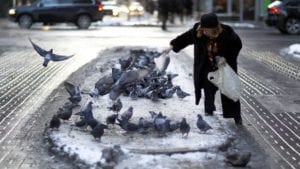
by Pigeon Patrol | Feb 5, 2020 | Animal Deterrent Products, Bird Netting, Bird Spike, Pigeon Droppings, Pigeon Spikes, Pigeons in the News, UltraSonic Bird Control
Sampling of pigeons captured on the streets of Madrid has revealed the bacterial pathogens they carry. Researchers writing in BioMed Central’s open access journal Acta Veterinaria Scandinavica found two bugs that were highly prevalent in the bird population, Chlamydophila psittaci and Campylobacter jejuni, both of which cause illness in humans carried by pigeons.
Fernando Esperón from the Animal Health Research Center, Madrid, Spain, worked with a team of researchers to analyse blood and enema samples taken from 118 pigeons caught using gun-propelled nets.
He said, “The present study demonstrates the extremely high prevalence of two zoonotic pathogens in feral pigeons in Madrid. At the same time, infection with these pathogens did not appear to be associated with any harmful clinical signs in the birds themselves. This leads to the hypothesis that pigeons act as asymptomatic reservoirs of Chlamydophila psittaci and Campylobacter jejuni. These birds may therefore pose a public health risk to the human population.”
Chlamydophila psittaci was found in 52.6% of the carried by pigeons captured, while Campylobacter jejuni was present in 69.1%. Although there have been few reports of disease transmission between pigeons and humans, it can occur by aerosols, direct contact or indirect contact through food and water contamination.
According to Esperón, “Thermophilic Campylobacter species are considered the primary pathogens responsible for acute diarrhea in the world. In fact, in many countries such as England and Wales, Canada, Australia and New Zealand Campylobacter jejuni infection causes more cases of acute diarrhea than infection by Salmonella species.”
Source
At Pigeon Patrol, we manufacture and offer a variety of bird deterrents, ranging from Ultra-flex Bird Spikes with UV protection, Bird Netting, 4-S Gel and the best Ultrasonic and audible sound devices on the market today.
Contact us at 1- 877– 4– NO-BIRD, (604) 585-9279 or visit our website at www.pigeonpatrol.ca
Bird Gone, Pigeon Gone, Seagull Gone, Pigeon issue, pigeon spikes, 1-877-4NO-BIRD, 4-S Gel, Bird Control, Pigeon Control, bird repellent, Bird Spikes, sonic bird repellent, stainless steel bird spikes, bird spikes Vancouver, Ultra Sonic Bird Control, Bird Netting, Plastic Bird Spikes, Canada bird spike deterrents, Pigeon Pests, B Gone Pigeon, Pigeon Patrol, pest controller, pest control operator, pest control technician, Pigeon Control Products, humane pigeon spikes, pigeon deterrents, pigeon traps, Pigeon repellents, Sound & Laser Deterrents, wildlife control, raccoon, skunk, squirrel deterrent, De-Fence Spikes, Dragons Den, Canada bird spikes, Canada pigeon, pigeon control, pigeon patrol, pigeon. Kill pigeons, crow, starling
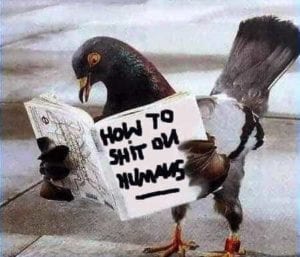
by Pigeon Patrol | Jan 31, 2020 | 4-S Gel Bird repellent, Animal Deterrent Products, Bird Spike, Pigeon Control, Pigeon Droppings, Pigeon Patrol's Services, Pigeon Spikes, Pigeons in the News, UltraSonic Bird Control
 Now that the weather is getting warmer, I’d like to open my windows and get some fresh air in my apartment. The windows and building are filthy grimy and covered with pigeon poop problem on the outside. The ledge and the side of the building are too. If I open the window the soot all blows into our apartment and I don’t even want to know what diseases could come from the poop. Are landlords required to wash the facade of a building? What about windows? I can still see out of them, but just barely. And if a landlord is required to do this, how can I get mine to do it? Our landlord does the bare minimum to maintain our building.
Now that the weather is getting warmer, I’d like to open my windows and get some fresh air in my apartment. The windows and building are filthy grimy and covered with pigeon poop problem on the outside. The ledge and the side of the building are too. If I open the window the soot all blows into our apartment and I don’t even want to know what diseases could come from the poop. Are landlords required to wash the facade of a building? What about windows? I can still see out of them, but just barely. And if a landlord is required to do this, how can I get mine to do it? Our landlord does the bare minimum to maintain our building.
My friend, Emma, is two and a half years old. She’s a big girl now and doesn’t need a diaper. But three or four months ago she could fill a diaper as well as any 6’5″ sailor who ate all the beans in the galley. I’m talking arm pits to knees! Where does it all come from? It’s as if small children are packed with adult-sized digestive systems. Same with pigeons; they generate a remarkable volume of poop given their size. Maybe it’s because they will eat anything, including the bodies of their fallen comrades.
Everyone who lives in a city has a pigeon story. I used to drive an MG convertible. I remember waiting at a stop light on Division Street. I happened to look up and from the steel girder above I noticed a pigeon’s ass maneuvering to drop a bomb. I couldn’t go anywhere! I ended up with what seemed to be a bucket load of shit running down the back of my shirt. Needless to say, I don’t believe any of wives’ tales about pigeon poop bringing good luck.
In fact pigeon poop is dangerous. There are several diseases associated with p-scat. Pigeons are the subjects of eradication programs throughout the world’s large cities.
In San Francisco, we have laws prohibiting the feeding of pigeons. The San Francisco Department of Public Health has a program devoted to dealing with pigeons and their excrement. If you have already complained to the landlord about the problem in writing and he has done nothing, call them.
I am not aware of any specific legal requirement for landlords to wash windows or facades of their buildings. But I’m willing to bet that there are other issues with the building and your apartment, given the lack of maintenance. Take a look around and check to see if there is peeling paint; windows that won’t open (sealed shut with shit?); cracks in the walls; leaks; other safety hazards, etc. If you believe there are violations, inform the landlord in writing. Again, if he doesn’t respond, call a Housing Inspector with the Department of Building Inspection, make a complaint and arrange for an inspection for this pigeon poop problem.
If the landlord tells you there is nothing he can do, maybe he needs a diaper.
Post From: Tenant Lawyers
At Pigeon Patrol, we manufacture and offer a variety of bird deterrents, ranging from Ultra-flex Bird Spikes with UV protection, Bird Netting, 4-S Gel and the best Ultrasonic and audible sound devices on the market today.
Contact us at 1- 877– 4– NO-BIRD, (604) 585-9279 or visit our website at www.pigeonpatrol.ca
Bird Gone, Pigeon Gone, Seagull Gone, Pigeon issue, pigeon spikes, 1-877-4NO-BIRD, 4-S Gel, Bird Control, Pigeon Control, bird repellent, Bird Spikes, sonic bird repellent, stainless steel bird spikes, bird spikes Vancouver, Ultra Sonic Bird Control, Bird Netting, Plastic Bird Spikes, Canada bird spike deterrents, Pigeon Pests, B Gone Pigeon, Pigeon Patrol, pest controller, pest control operator, pest control technician, Pigeon Control Products, humane pigeon spikes, pigeon deterrents, pigeon traps, Pigeon repellents, Sound & Laser Deterrents, wildlife control, raccoon, skunk, squirrel deterrent, De-Fence Spikes, Dragons Den, Canada bird spikes, Canada pigeon, pigeon control, pigeon patrol, pigeon. Kill pigeons, crow, starling
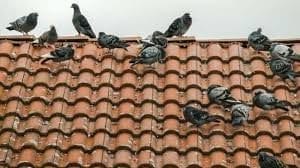
by Pigeon Patrol | Jan 31, 2020 | 4-S Gel Bird repellent, Animal Deterrent Products, Bird Deterrent Products, Bird Spike, Bird Spikes, Pigeon Control, Pigeon Patrol's Services, Pigeon Spikes, UltraSonic Bird Control
Pigeons are as integral to city living as traffic and pollution, and perhaps as annoying and potentially dangerous. These birds can cause property damage and carry diseases. However, there are humane ways to minimize or keep pigeons off your property. Find out how, together with some alleged solutions that simply don’t work or are not recommended.
The problems with pigeons

Pigeons often carry salmonella and other diseases. Their nests may harbor bird mites, bed bugs and other biting, disease-carrying insects. Because pigeon droppings are highly acidic, they can damage car paint and buildings. According to the New York City Department of Health and Mental Hygiene, pigeon droppings often carry fungi or bacteria that cause the human diseases cryptococcosis, histoplasmosis and psittacosis. Exposure to these diseases happens primarily when cleaning up pigeon droppings.
Solutions that work
You may have noticed that pigeons are everywhere. To keep all pigeons off your property may be unrealistic. You can reduce nesting populations in your immediate area by inspecting your property for nests, and removing nests and eggs every two weeks. More importantly, focus on keeping pigeons out of buildings and other spaces.
- Wire mesh and wire: Screen all soffit vents and other potential entry points with rust-proof wire mesh. University of Florida professor William Kern also recommends suspending a thin wire or mono filament about two inches above a railing or other potential roost, or adding sticky substances, deterring pigeons from resting on the rails.
- Sheet metal: To keep pigeons off ledges and other flat potential roosts, cover them with a sloping piece of sheet metal. A slanted metal board doesn’t make much of a roost.
- Bird netting: Alternatively, use bird netting to seal off spaces above barn rafters and other potential roosts.
- Scare-pigeons: Try the pigeon equivalent of scarecrows. Among the most effective “scare-pigeons” are kites with hawk silhouettes and light Mylar streamers. Both move easily in the wind, scaring off birds. On the other hand, pigeons will quickly grow accustomed to a model owl that sits in one spot for a while.
- Spray pigeons with water: Kern even suggests spraying pigeons with a water hose, but notes that the birds must be sprayed upon arrival, before they start to establish a regular roosting spot. Once they have established a roost, your impromptu showers won’t keep them from going home.
- Pigeon traps: If you fail to exclude pigeons or prevent roosting, you may need to make a trap or buy a commercial trap. Be sure to check each trap at least once a day, and leave water in the trap, to attract more birds and minimize stress on any pigeons that get caught. Immediately release all other birds you were not aiming to catch.
- Humane pest control. Find a pest control expert who specializes in humane solutions to infestation by pigeons and other unwanted creatures.
Solutions that DON’T work
Not every alleged pigeon control works. Here are a few urban legends:
- Loud noises: Loud noises have been suggested for controlling birds, but they are likely to annoy neighbors more than pigeons. City birds are used to city noises, and don’t seem to startle easily.
- Cheap Ultrasonic noises: Ultrasonic noises that humans cannot hear may avoid bothering your neighbors, but Kern notes that some ultrasonic sound waves bounce off objects, creating spots where pigeons can avoid the sound. Also, some ultrasonic devices may damage the hearing of cats and dogs. Although some ultrasonic units has proven to keep pigeons off your property.
- Distress calls: There are no effective distress calls that can be used to target pigeons.
- Poison and chemical repellents: Pigeon poisons and chemical repellents are available, but they are strictly controlled for several reasons. They can kill or sicken other birds or animals, or even somebody’s prized racing pigeon. (Yes, there are pigeon racing clubs. If you trap a tagged pigeon, click here (for information on returning it.)
Full story here
At Pigeon Patrol, we manufacture and offer a variety of bird deterrents, ranging from Ultra-flex Bird Spikes with UV protection, Bird Netting, 4-S Gel and the best Ultrasonic and audible sound devices on the market today.
Contact us at 1- 877– 4– NO-BIRD, (604) 585-9279 or visit our website at www.pigeonpatrol.ca
Bird Gone, Pigeon Gone, Seagull Gone, Pigeon issue, pigeon spikes, 1-877-4NO-BIRD, 4-S Gel, Bird Control, Pigeon Control, bird repellent, Bird Spikes, sonic bird repellent, stainless steel bird spikes, bird spikes Vancouver, Ultra Sonic Bird Control, Bird Netting, Plastic Bird Spikes, Canada bird spike deterrents, Pigeon Pests, B Gone Pigeon, Pigeon Patrol, pest controller, pest control operator, pest control technician, Pigeon Control Products, humane pigeon spikes, pigeon deterrents, pigeon traps, Pigeon repellents, Sound & Laser Deterrents, wildlife control, raccoon, skunk, squirrel deterrent, De-Fence Spikes, Dragons Den, Canada bird spikes, Canada pigeon, pigeon control, pigeon patrol, pigeon. Kill pigeons, crow, starling

by Pigeon Patrol | Jan 31, 2020 | Animal Deterrent Products, Bird Deterrent Products, Bird Netting, Bird Spikes, Pigeon Control, Pigeon Droppings, Pigeon Patrol's Services, Pigeon Spikes, Pigeons in the News
Feed a Pigeon, Breed a Flying RAT

Q: I’ve often heard that it is illegal to feed pigeons in New York, yet I see people doing it all the time. Is there really such a law? And if so, why isn’t it enforced?
A: Despite a common public perception, there is no law that makes pigeon feeding illegal everywhere in the city. That said, the Parks Department posts notices prohibiting feeding in many areas under its control. If you ignore the sign, you may get an Environmental Control Board summons from the parks enforcement patrols or from the Police Department. The usual penalty is the minimum of $50, which you can mail in. You can fight it in court, but you can be fined $100 if you are found guilty.
Even where pigeon feeding is not prohibited, both the Parks and Health Departments discourage the practice, citing litter and rodent problems. A Health Department poster warns: “Feed a Pigeon, Breed a Flying Rat.”
This attitude irks Anna Dove, founder and director of the New York Bird Club. “There is never any left-over feed from people feeding pigeons and other wildlife in the city, so littering is a poor excuse against pigeon feeding,” said Ms. Dove. (Yes, that’s her name; she had it legally changed from Augusta Kugelmas when she founded the club about three years ago.)
“After I feed,” she added, “most of the time I remain in the area to make sure the feed is not swept away by building maintenance people. Every morsel is eaten.”
Source: NY Times
At Pigeon Patrol, we manufacture and offer a variety of bird deterrents, ranging from Ultra-flex Bird Spikes with UV protection, Bird Netting, 4-S Gel and the best Ultrasonic and audible sound devices on the market today.
Contact us at 1- 877– 4– NO-BIRD, (604) 585-9279 or visit our website at www.pigeonpatrol.ca
Bird Gone, Pigeon Gone, Seagull Gone, Pigeon issue, pigeon spikes, 1-877-4NO-BIRD, 4-S Gel, Bird Control, Pigeon Control, bird repellent, Bird Spikes, sonic bird repellent, stainless steel bird spikes, bird spikes Vancouver, Ultra Sonic Bird Control, Bird Netting, Plastic Bird Spikes, Canada bird spike deterrents, Pigeon Pests, B Gone Pigeon, Pigeon Patrol, pest controller, pest control operator, pest control technician, Pigeon Control Products, humane pigeon spikes, pigeon deterrents, pigeon traps, Pigeon repellents, Sound & Laser Deterrents, wildlife control, raccoon, skunk, squirrel deterrent, De-Fence Spikes, Dragons Den, Canada bird spikes, Canada pigeon, pigeon control, pigeon patrol, pigeon. Kill pigeons, crow, starling

by Pigeon Patrol | Jan 31, 2020 | Bird Spikes, Pigeon Control, Pigeon Droppings, Pigeon Patrol's Services, Pigeons in the News
WIMBLEDON, England, July 6 It’s clear skies Thanks to Wayne Davis and his fine-feathered friends, raindrops are the only thing that Wimbledon fans have to worry about dropping from the sky and into their bowls of strawberries and cream.
The All England Club would seem a wonderful place to be a pigeon. There are nooks, crannies and overhangs. There are trees and grass. And, for two weeks out of the year, there is litter and food and people to hassle, which seems to be what pigeons do best.
But there are no pigeons here, save the occasional wayward straggler who, apparently, has only recently arrived from out of town.
Davis stood on the grass-covered terrace atop the Broadcast Center, several stories high, about even with the top of Center Court. From there you could see the tennis courts below, the leafy suburbs that surround them, and downtown London in the distance.
And, above, was one of his Peregrine falcons, circling the sky, issuing a silent warning that being a pigeon and being here is not a good idea.
Davis swung a rope like a lasso. At its end was a meaty piece of quail attached to a leather lure. The falcon, this one named Callisto, dived toward the food and swooped past, like a bull to a matador. After a few passes, Davis dropped the decoy to his feet, and the brown falcon with a speckled chest came down to earth and feasted.
“I’ve been doing this 25 years,” said Davis, smiling at the spectacle of the bird’s flight. “I still think that was brilliant. I enjoyed that.”
Wimbledon began its championship in 1877, and for most of the years since, pigeons have been among those who flocked to watch and socialize. They would eat the grass seed in the spring and nest under the Center Court roof. Every year, workers would try to remove the nests before the tournament. Still, the pigeons would flutter about the courts, and, well, bomb the fans with unpleasant surprises.
“In the old, old days, they probably used to shoot them,” the Wimbledon spokesman Johnny Perkins said of the pigeons in London and at the tennis club. “But in these touchy feely times, they probably decided that wasn’t the best option. This seems to be the best compromise, really.”
Helping Wimbledon limit its spectators to ticket-holding humans was the idea of Davis’s wife. She was watching the tournament on television a few years ago, and saw players shooing pigeons with rackets. So Davis called the All England Club and offered a demonstration of his services. The club liked what it saw, and Davis was hired beginning in 1999.
Davis owns a company called Avian Control Systems. With his small flock of hawks, falcons and owls, he shoos other birds using little more than fright tactics. Lesser birds see his birds soaring around, and they find somewhere else to go.
“Falconer,” Davis said, chewing on a suggestion for his job title. “I like that. I get called bird man, but falconer is nice, isn’t it?”
Davis does much of his work at airports and military airfields, where geese, gulls and other unsuspecting birds can pose safety risks if they find their way into jet engines.
Other clients see birds as a nuisance, not a danger. Davis has contracts with Westminster Abbey and Canary Wharf, a glass-and-steel business district along the Thames. Like the All England Club, they wanted a non-messy way to get rid of the mess-making birds, particularly the feral pigeon, the familiar gray ones common to so many cities.
“In the middle of the city, there are hundreds of thousands of pigeons all around,” Davis said. “All we can do is make it less comfortable for them.”
Pigeons, it seems, have memories that last at least a couple of days. At Wimbledon, Davis and his birds come a few times a week, throughout the year. That is enough to keep them from roosting in the rafters of the show courts “They’re like surrogate cliffs, really,” Davis said and from eating the grass seed when it is planted in the spring across nearly 40 courts.
“It’s analogous to cleaning,” he said. “You solve the problem with an intensive period, and keep it up with maintenance.” 
At his country house in Northamptonshire, well north of London, Davis and his birds load into a van before dawn, so that they can do their work before the tennis crowds arrive.
On the roof, with its postcard view, Davis sent the falcon flying. A small bell was attached to its tail, and a radio transmitter to its ankle. It circled and swooped, then lifted like a rocket toward the gray clouds. There was not a pigeon in sight.
And down below, workers were preparing Wimbledon for another day. Somewhere, strawberries were being readied, and vats of cream sat in a cooler. Wimbledon cannot do much about the rain, but it is not fully ceding the skies.
Source from NY Times
At Pigeon Patrol, we manufacture and offer a variety of bird deterrents, ranging from Ultra-flex Bird Spikes with UV protection, Bird Netting, 4-S Gel and the best Ultrasonic and audible sound devices on the market today.
Contact us at 1- 877– 4– NO-BIRD, (604) 585-9279 or visit our website at www.pigeonpatrol.ca
Bird Gone, Pigeon Gone, Seagull Gone, Pigeon issue, pigeon spikes, 1-877-4NO-BIRD, 4-S Gel, Bird Control, Pigeon Control, bird repellent, Bird Spikes, sonic bird repellent, stainless steel bird spikes, bird spikes Vancouver, Ultra Sonic Bird Control, Bird Netting, Plastic Bird Spikes, Canada bird spike deterrents, Pigeon Pests, B Gone Pigeon, Pigeon Patrol, pest controller, pest control operator, pest control technician, Pigeon Control Products, humane pigeon spikes, pigeon deterrents, pigeon traps, Pigeon repellents, Sound & Laser Deterrents, wildlife control, raccoon, skunk, squirrel deterrent, De-Fence Spikes, Dragons Den, Canada bird spikes, Canada pigeon, pigeon control, pigeon patrol, pigeon. Kill pigeons, crow, starling
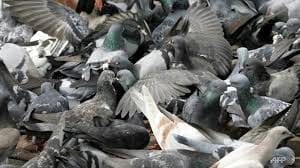
by Pigeon Patrol | Jan 30, 2020 | Bird Deterrent Products, Bird Netting, Bird Spikes, Pigeon Droppings, Pigeon Patrol's Services, Pigeons in the News, UltraSonic Bird Control
Is Hutchinson facing growing pigeon problems? The experts agree: There are definitely more pigeons in Hutchinson these days.

And with the increased population comes growing pigeon problems related both to public health and property maintenance.
Pigeons plague the Reno County Courthouse, several churches and most of the downtown area.
Many people are resigned that pigeons are a natural addition to any tall building, but some Hutchinson business owners are taking a stand.
Last week, Advance Pest Control performed a “baiting” of pigeons in the downtown area.
Advance was hired by a coalition of business owners – who have remained anonymous to The Hutchinson News – who sought to reduce the pigeon population downtown because of health concerns and property damage.
In the baiting, toxic corn was strategically placed about the downtown area.
The birds who eat the bait eventually die but first display intoxicated behavior.
“Basically, this behavior is a stress signal to the other birds, which leave the area because they sense that something is not right,” said Jeff Wells, vice president of Advance. “So it results in a great reduction in population in a specific area because of the birds who take a toxic dose as well as the repellency issue.”
The baiting has resulted in a reduced population of pigeons downtown, but Wells said he has noticed that there are more birds roosting on nearby buildings that weren’t baited.
Health, property concerns
Pigeon droppings aren’t just a nuisance or an extra chore for property owners. Because they are acidic, they actually cause property damage, eating through metal and deteriorating signs and other metal objects at a rapid rate.
The biggest growing pigeon problems, though, comes in cleaning the droppings.
Pigeon fecal matter is a breeding ground for a spore called histoplasmosis, which can cause an infection that leads to respiratory disease, according to the Centers for Disease Control and Prevention. The infection, if it affects other organs, can be fatal if untreated.
Workers cleaning up the droppings cause histoplasmosis spores to become airborne and are infected when they breathe them in.
Pigeons are also known to carry or transmit pigeon ornithosis, encephalitis, Newcastle disease, cryptococcosis, toxoplasmosis, salmonella food poisoning and several other diseases, according to the Kansas Department of Wildlife and Parks.
For that reason, the Kansas Department of Agriculture files the use of certain pigeon-control products under the category of public health and safety.
It’s a problem not lost on local businesses.
Next week, workers trained in safely removing pigeon waste will clean piles of pigeon droppings from the Fox Theatre marquee, which is being eroded by the waste, said board president Greg Payton.
Payton added that some theater employee illnesses have been blamed on the droppings.
Birds not protected
Pigeons are not protected by Kansas law, meaning property owners are free to dispose of them as they wish, Wells said.
But until the recent baiting, little has been done over the past seven years to control the pigeon population, which has led to the increase Hutchinson is seeing now, Wells said.
“The population has definitely increased,” Wells said. “There’s no question about that.”
In 2001, a baiting occurred, although it wasn’t performed by Advance, Wells said. A reduction in the pigeon population followed, but then the pigeon population was generally left alone except for some property owners putting up spikes or other roosting deterrents.
“These birds breed so quickly that the population explodes when nothing is done to limit them,” Wells aid.
Even some pigeon enthusiasts seem to understand the need for the population control.
“I don’t know the real solution,” said Mel Voth, a Garden City man who raises homing pigeons. “There are ways to divert them to other places, but I think a lot of folks feel like the baiting is the easiest way to reduce the population.”
Wells said there will always be a struggle between people who want pigeons eliminated and those who believe it’s wrong to kill them off, but he believes there can be a healthy compromise.
“Ultimately, we are trying to protect public health and safety, not eliminate a species of birds,” he said. “I place the safety of my kids above the population of pigeons. When the population reaches a certain point, it becomes an issue and something needs to be done.”
Source of the Story
About Pigeon Patrol
Pigeon Patrol Products & Services is the leading manufacturer and distributor of bird deterrent (control) products in Canada. Pigeon Patrol products have solved pest bird issues in industrial, commercial, and residential settings since 2000, by using safe and humane bird deterrents with only bird and animal friendly solutions.
At Pigeon Patrol, we manufacture and offer a variety of bird deterrents, ranging from Ultra-flex Bird Spikes with UV protection, Bird Netting, 4-S Gel and the best Ultrasonic and audible sound devices on the market today.
Contact us at 1- 877– 4– NO-BIRD, (604) 585-9279 or visit our website at www.pigeonpatrol.ca
Bird Gone, Pigeon Gone, Seagull Gone, Pigeon issue, pigeon spikes, 1-877-4NO-BIRD, 4-S Gel, Bird Control, Pigeon Control, bird repellent, Bird Spikes, sonic bird repellent, stainless steel bird spikes, bird spikes Vancouver, Ultra Sonic Bird Control, Bird Netting, Plastic Bird Spikes, Canada bird spike deterrents, Pigeon Pests, B Gone Pigeon, Pigeon Patrol, pest controller, pest control operator, pest control technician, Pigeon Control Products, humane pigeon spikes, pigeon deterrents, pigeon traps, Pigeon repellents, Sound & Laser Deterrents, wildlife control, raccoon, skunk, squirrel deterrent, De-Fence Spikes, Dragons Den, Canada bird spikes, Canada pigeon, pigeon control, pigeon patrol, pigeon. Kill pigeons, crow, starling

by Pigeon Patrol | Jan 30, 2020 | Bird Netting, Bird Spike, Pigeon Control, Pigeon Droppings, Pigeon Spikes, Pigeons in the News
At Pigeon Patrol we like to share what we know about pigeons so you know what you are dealing with with this pigeon advisory

Breeding period: All year round
Nest: Rough nest made with twigs usually on or in buildings and never in trees
Number of eggs: 2 white eggs
Incubation period: 18/19 days
Fledging period: 25/32 days (up to 45 days in winter)
Food: Seed eater that will exploit multiple food sources including waste food in urban areas and deliberate feeding by the public.
Click Here to see pigeon related diseases in their droppings
Pigeons are commonly found roosting and breeding in roof voids and attic spaces with property owners often needing to exclude them and block up the entry/exit holes. It is important to be aware that because the pigeon breeds all-year round there is never a safe time to exclude birds when there will not be pigeon squabs (chicks) or flightless juvenile birds in situ. Blocking access holes may result in adult and flightless birds becoming trapped. Apart from the obvious humanitarian implications there are serious health and safety implications for the property owner concerned. If birds die as a result of having been sealed inside a void of any description the decomposing carcasses will become maggot-infested within a matter of days, particularly in summer months.
What you can do to prevent pigeon nuisances:
- Remove all FOOD AND WATER SOURCES from the property
- Remove all BIRD WASTE, feathers and abandoned nesting materials
- Discourage ROOSTING with wire or nylon mesh or other materials
- Maintain property in a clean, nuisance-free condition at all times
- Do NOT feed pigeons
Pigeon Patrol has pioneered highly effective methods of controlling pigeon population in your area please check out our products to see how you can deal with unwanted pigeons in your home today. Stay tuned to learn more with pigeon advisory as we update it through time.
At Pigeon Patrol, we manufacture and offer a variety of bird deterrents, ranging from Ultra-flex Bird Spikes with UV protection, Bird Netting, 4-S Gel and the best Ultrasonic and audible sound devices on the market today.
Contact us at 1- 877– 4– NO-BIRD, (604) 585-9279 or visit our website at www.pigeonpatrol.ca
Bird Gone, Pigeon Gone, Seagull Gone, Pigeon issue, pigeon spikes, 1-877-4NO-BIRD, 4-S Gel, Bird Control, Pigeon Control, bird repellent, Bird Spikes, sonic bird repellent, stainless steel bird spikes, bird spikes Vancouver, Ultra Sonic Bird Control, Bird Netting, Plastic Bird Spikes, Canada bird spike deterrents, Pigeon Pests, B Gone Pigeon, Pigeon Patrol, pest controller, pest control operator, pest control technician, Pigeon Control Products, humane pigeon spikes, pigeon deterrents, pigeon traps, Pigeon repellents, Sound & Laser Deterrents, wildlife control, raccoon, skunk, squirrel deterrent, De-Fence Spikes, Dragons Den, Canada bird spikes, Canada pigeon, pigeon control, pigeon patrol, pigeon. Kill pigeons, crow, starling
Pidgeon Patrol has pioneered highly effective methods of controlling pigeon population in your area please check out our products to see how you can deal with unwanted pidgeons in your home today.























